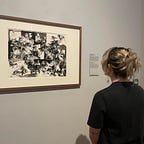Harrison Whitford is ‘Afraid of Nothing’ in his candid sophomore album
This article was written as part of my MA Journalism coursework, and is intended to imitate the writing style of Pitchfork.
This record truly lives up to its title, delving into Whitford’s experiences with love and heartbreak.
The name of Harrison Whitford’s second album is evidence enough of his growth over the last four years. Afraid of Nothing, a follow-up to his 2018 debut Afraid of Everything, explores the complexities of intimacy and sorrow with more clarity and confidence than ever before. This record is still characteristically subdued, but showcases bolder lyrics and more refined production than its predecessor.
Most famous for his collaborations with The National’s Matt Berninger and indie aritst Phoebe Bridgers, Whitford’s individual genius seems to have slipped under the radar. Whilst his work offers the same kind of Bridgers-esque introspection, its delivery is much more subtle. Left behind are the powerful guitar segments we hear on 2020’s Punisher- instead, Whitford is much more gentle in his own candour.
Afraid of Nothing expresses its composer’s meloncholia in personal yet relatable way. “Anyplace I Am” conveys dissatisfaction with modern life via simplistic lyrics and a repetitive piano melody, with this format only being broken by the bridge “Every week’s a different mountain, I wish I wasn’t scared of heights”- a metaphor for feeling too helpless to change. In “Secret Garden” he describes his loneliness as a “manic mansion” and a “king-sized bed”, spaces too large and complex for him to navigate on his own. The stripped back, echoey production of this track effectively draws us into his sense of isolation.
No topic is too private for Whitford, who doesn’t shy away from discussing the failure of past relationships. His voice trembles over a haunting synth on “Ears That Could” as he attempts to reesetablish closeness with friends and family, and on “Salvation Army” he laments a breakdown of communication (“I tried to show you where the North Star was; You couldn’t see a single constellation”). These lyrics are much more self-aware than those on his debut album, and as Whitford himself told Atwood Magazine, “less accusatory, [and] less concerned with the idea of betrayal”.
This personal development is reflected in two songs in particular: “Linoleum” and “Afraid of Nothing”. The former holds a deceptively cheerful melody for a song about realising one’s own shortcomings- but perhaps sharing these flaws with the world is liberating for Whitford. Conversly, the record’s titular track discusses a shift away from bad habits, where he playfully wonders if “This is what they call self help”.
Above all else, what makes Afraid of Nothing feel so intimate is the delicate, almost hushed quality of Whitford’s voice. His songs feel like whispered confessions, secrets traded in the middle of the night. Many have likened this quiet conversationalism to the work of Elliott Smith, whom Whitford has cited as a major influence. To me it feels comfortable and familiar, like talking with an old friend.
Afraid of Nothing’s closing track, aptly titled “End”, offers two and a half minutes of soft, lyricless synth in which we are encouraged to contemplate the songs we have just heard. Although they centre around Whitford’s own experiences, throughout their duration we are invited to be vulnerable with him, to take our own journey of self-reflection. Overall, it’s nice to think that his aim as a musician is for listeners to “take anything away from [his music] at all”- because there is so much for us to take from his sophmore record.
